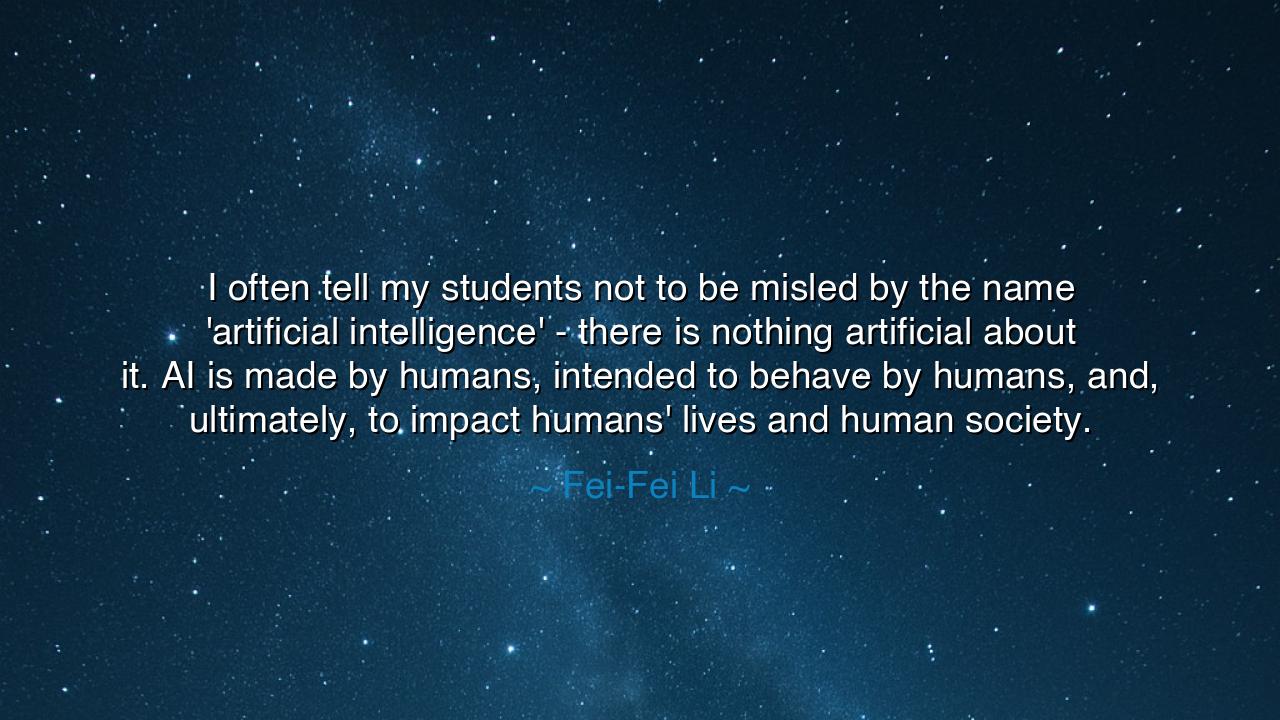
I often tell my students not to be misled by the name 'artificial
I often tell my students not to be misled by the name 'artificial intelligence' - there is nothing artificial about it. AI is made by humans, intended to behave by humans, and, ultimately, to impact humans' lives and human society.






The Human Heart Within the Machine
In the wise and visionary words of Fei-Fei Li, a pioneer in the field of artificial intelligence, we hear a truth that pierces the illusions of our age: “I often tell my students not to be misled by the name ‘artificial intelligence’—there is nothing artificial about it. AI is made by humans, intended to behave by humans, and, ultimately, to impact humans’ lives and human society.” Beneath this statement lies a profound understanding of both creation and responsibility. For she reminds us that AI, though wrought of code and circuits, is no alien force—it is a mirror, reflecting back the light and shadow of its maker. What we call “artificial” is, in truth, the continuation of human will, human purpose, and human consequence.
The meaning of this quote lies in its unveiling of the hidden truth behind technology: that every machine, every algorithm, every invention is a vessel of the human spirit. To call intelligence “artificial” is to forget that it is born from our curiosity, our desire to understand, and our power to create. The hands that build the machine, the minds that design it, and the societies that use it—all are human. Thus, when Fei-Fei Li says there is nothing “artificial” about AI, she means that its origin is deeply organic—rooted in our collective dreams and fears. It is not the cold creation of a machine, but the living continuation of humanity’s age-old quest to extend the boundaries of mind.
The origin of this quote comes from the halls of teaching and research, where Fei-Fei Li sought to awaken her students not only to the power of technology but to its ethical weight. As one of the founders of modern computer vision, she saw both the brilliance and the peril of her work. AI could diagnose disease, predict disaster, and connect distant hearts—but it could also divide, deceive, and dehumanize if built without conscience. Thus, she urged her disciples to remember: the code they write is not neutral; it carries within it the fingerprints of their values. The “intelligence” they build will think as they have taught it to think. In this, she stands as a philosopher as much as a scientist, calling her students to wisdom rather than mere mastery.
Consider the ancient myth of Prometheus, who stole fire from the gods to give to man. That fire, like AI, was neither good nor evil—it was power, pure and potent. With it, humanity forged civilization; yet with it also came destruction and pride. Prometheus’s gift symbolized the dawn of creation, but also the burden of responsibility. So too with artificial intelligence: it is a fire we have kindled from our own intellect, capable of warming or burning the world. Fei-Fei Li’s words echo through this mythic lineage—she warns that the flame we hold is ours, and what it becomes depends on the spirit that wields it.
There is another tale, not of gods but of history. When the Industrial Revolution dawned, machines began to replace men in fields and factories. The world rejoiced at progress, but forgot to tend the hearts of those displaced. Wealth grew, yet inequality deepened. Now, as we stand upon the threshold of the AI Revolution, the same danger looms. Fei-Fei Li’s wisdom is a shield against that error. She urges that we build with empathy, govern with justice, and design with humility. For the future of intelligence—be it artificial or human—depends not on the machine’s capacity, but on our own moral clarity.
The lesson is clear: technology does not absolve humanity of responsibility—it magnifies it. We must recognize that every algorithm is an echo of its creator’s soul. The biases of the mind become the biases of the machine; the compassion of the heart becomes its mercy. Thus, those who build the future must cultivate not only skill but virtue. They must learn not only to think, but to care. The true engineer of tomorrow must be both scientist and sage, seeing beyond numbers into the realm of meaning. For what is intelligence without wisdom but a weapon waiting to be wielded?
Therefore, O children of the digital dawn, heed this wisdom: do not be misled by the name “artificial.” Remember that behind every program is a human pulse, behind every robot a human hand. Shape your creations as you would shape yourselves—with integrity, compassion, and foresight. Let your machines serve life, not enslave it. Build systems that heal, that unite, that uplift, and in doing so, you will not only forge a new age of intelligence—you will ennoble the ancient purpose of humanity itself: to create in the image of conscience.
And when the day comes that the world marvels at the works of your hands, let them say not, “Behold what the machines have made,” but rather, “Behold what humanity has become.” For in the words of Fei-Fei Li, there is no intelligence apart from the human heart—and no progress worth achieving without the soul of its maker.






AAdministratorAdministrator
Welcome, honored guests. Please leave a comment, we will respond soon